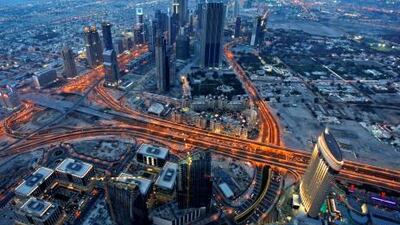Dubai is considering privatising some of its most prized assets to raise money for billions of dollars in upcoming debt repayments.
"There might be a privatisation plan, which is something we're working on with the Government," Mohammed al Shaibani, the director general of the Dubai Ruler's Court and the chief executive of the Investment Corporation of Dubai (ICD), said. "Dubai is rich in assets and … this might be used as a mechanism to reduce some of our debts in the future."
Mr al Shaibani was speaking yesterday at the first quarterly update on Dubai's economy, part of the Government's plans to increase its openness after the financial crisis. The meeting was also attended by Sheikh Mohammed bin Rashid, the Vice-President of the UAE and Ruler of Dubai
Mr al Shaibani is a member of a three-man Supreme Committee set up to oversee Dubai World's US$24.9 billion (Dh91.45bn) debt restructuring.
Mr al Shaibani recently told the Financial Timesthere was no need for the Government to have full ownership of Emirates Airline, which could be partially sold to investors through a public listing.
But the privatisation plan could also apply to Dubai's other assets, including its lucrative ports operations. Most of those assets are held by ICD, an investment arm fully integrated into the Government.
Privatisations would help Dubai reduce its direct sovereign debt, which Mr al Shaibani estimated at $30bn. Dubai's total debt load, however, is thought to be more than $100bn when including debts of state-linked companies.
Much of that debt falls due within the next two years. Analysts say Dubai will have to raise more money through bond issues and possibly asset sales after selling $1.25bn of bonds in September.
Analysts at the Bank of America Merrill Lynch said recently that Dubai faced more than $40bn of repayments next year and in 2012.
After Dubai World completed its restructuring in September, worry has intensified about Dubai Holding, an investment conglomerate owned by Sheikh Mohammed bin Rashid. Divisions of Dubai Holding started talks with creditors this year about extending repayment on debts estimated at more than $9bn.
Sheikh Ahmed bin Saeed Al Maktoum, the chairman of the Supreme Committee overseeing the restructure,said: "I am truly happy to report that Dubai World is now on a sound financial footing and is fully refocused on its core business, which invariably will improve the long-term value of its assets for the benefit of all stakeholders. "It is no secret that we are looking at Dubai Holding, which is facing challenges in some of its assets and investments ... the challenges in Dubai Holding are in no way of the magnitude seen at Dubai World."
afitch@thenational.ae

